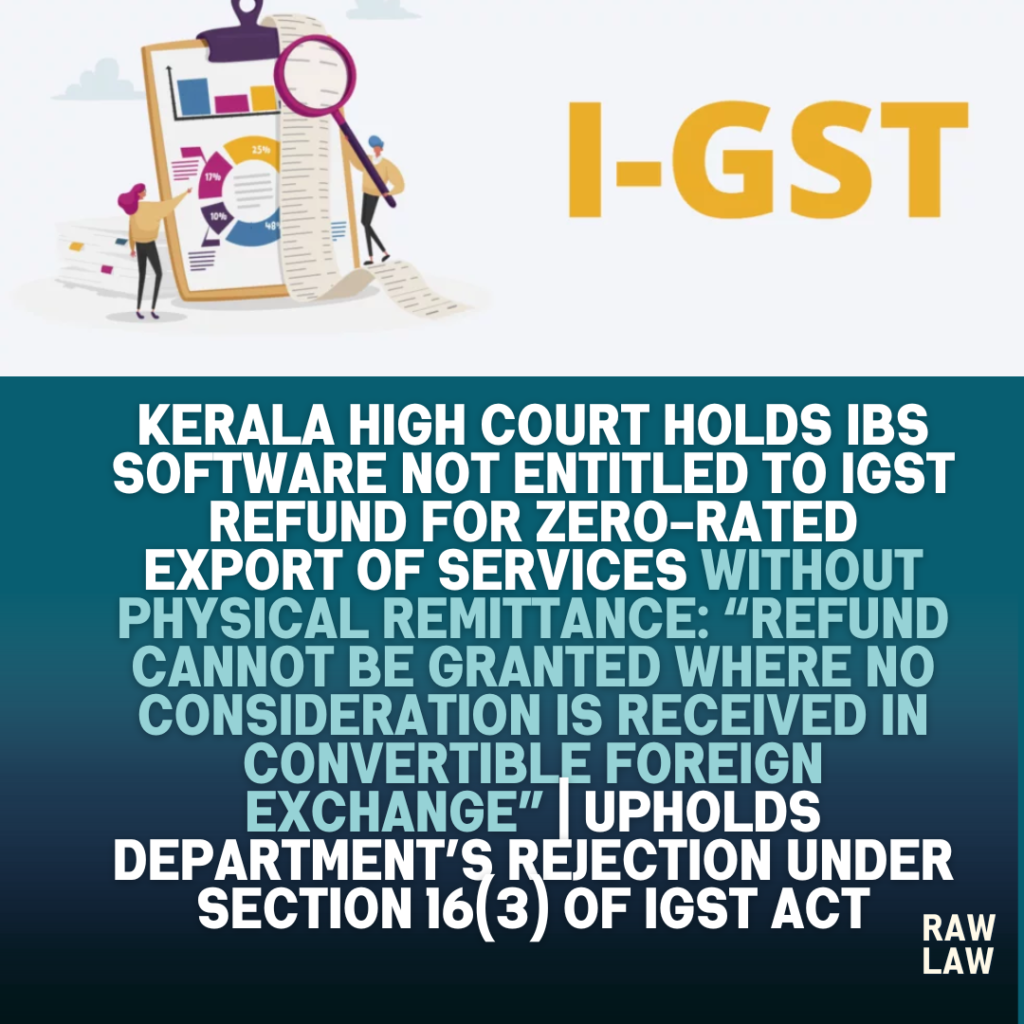Court’s Decision
In WP(C) No. 26238 of 2020, the Kerala High Court upheld the rejection of Integrated Goods and Services Tax (IGST) refund claims made by IBS Software Services Private Limited. The Single Bench of Justice Gopinath P. ruled that the petitioner was not entitled to refund under Section 16(3) of the IGST Act, 2017, as there was no receipt of consideration in convertible foreign exchange for the relevant transactions. The Court held that mere journal entries between Indian branches of a foreign entity do not constitute “receipt of consideration” for export of services under GST laws.
Facts
The petitioner, an SEZ unit, entered into a Service Agreement dated 01.04.2017 with IBS Software Pte Ltd., Singapore, to provide software services. Refunds were claimed for unutilised Input Tax Credit (ITC) for the tax periods August 2018 to March 2019, asserting that the services were zero-rated exports.
However, the department rejected the refund application, stating that the consideration for the alleged export of services was not received in convertible foreign exchange. The petitioner admitted that the Singapore entity did not make any remittance during the relevant period and that the corresponding accounting entries were internal journal entries made between branches of the same company.
Issues
- Whether the petitioner’s services qualified as zero-rated exports under Section 16 of the IGST Act despite non-receipt of foreign currency consideration?
- Whether journal entries between two Indian branches of a foreign company satisfy the requirement of “receipt in convertible foreign exchange” for refund under Section 16(3)?
- Whether the petitioner was entitled to refund of unutilised ITC under the IGST framework?
Petitioner’s Arguments
The petitioner contended that:
- The services were indeed exported to a foreign company, i.e., IBS Software Pte Ltd., Singapore.
- The accounting treatment involved routing payment through the Hyderabad branch of the foreign company, with entries made in India reflecting receipt.
- The supply of services was bona fide, cross-border in nature, and the consideration was deemed received through accounting adjustments.
- The circulars and procedural requirements under the GST laws should be interpreted purposively and not rigidly, especially in cases involving genuine SEZ units and zero-rated exports.
Respondent’s Arguments
The Revenue argued that:
- The consideration for the so-called exports was never received in convertible foreign exchange.
- The payments recorded were only journal entries between two establishments of the same foreign company—Hyderabad and Singapore—and hence not eligible as ‘receipts’ under the Foreign Exchange Management Act (FEMA).
- Under Section 2(6) and 16(3) of the IGST Act, refund is allowed only if the service is exported and the consideration is received in foreign currency.
- The accounting treatment adopted by the petitioner amounted to intra-company adjustments and could not be equated to real remittance.
Analysis of the Law
The Court closely examined Section 2(6) of the IGST Act, 2017, which defines ‘export of services’. One of the key requirements is that payment for such services must be received in convertible foreign exchange.
It also relied on Rule 96A of the CGST Rules, which mandates that refund is available only when consideration is actually received in convertible foreign currency within the prescribed time.
The Court held that journal entries reflecting inter-branch transfers do not satisfy this requirement. It further noted that allowing such accounting treatments would open doors for manipulation and defeat the objective of IGST refund procedures, which are designed to encourage actual inflow of foreign exchange.
Precedent Analysis
The Court referred to:
- Union of India v. VKC Footsteps India Pvt. Ltd. (2021) 16 SCC 549 – Reiterated the statutory framework of refund mechanisms and limited scope of judicial interference in fiscal statutes.
- Sony India Pvt. Ltd. v. Commissioner of Central Excise, Delhi [(2007) 213 ELT 10 (Tri. Del)] – Cited for principle that inter-unit journal entries cannot be equated to independent commercial transactions for tax credit/refund purposes.
- Circular No. 37/11/2018-GST dated 15.03.2018 – Highlighted the requirement of actual receipt in convertible foreign exchange for export classification under GST.
The Court found these binding precedents to support the view that refund claims under Section 16(3) cannot be sustained without real foreign exchange inflow.
Court’s Reasoning
The Court found that:
- The Singapore entity had not transferred any foreign currency to the petitioner.
- The transactions recorded were merely inter-branch accounting adjustments within the same foreign company, routed through the Hyderabad branch.
- The petitioner failed to demonstrate compliance with the statutory condition of receipt of foreign exchange.
- No evidence was produced to show that RBI had treated the journal entries as equivalent to foreign remittance under FEMA.
Thus, it held that the refund rejection was legally valid and required no interference.
Conclusion
The writ petition was dismissed. The Court upheld the department’s order rejecting the IGST refund, reiterating that receipt of consideration in convertible foreign exchange is a mandatory precondition for any claim under Section 16(3) of the IGST Act.
Implications
This judgment is significant for export-based entities, especially SEZ units, that rely on intra-group transactions. It clarifies that accounting entries between branches of a multinational entity will not suffice as ‘receipt of consideration’ for IGST refund claims. The ruling reinforces the requirement of actual foreign currency inflow, aligning GST refund eligibility with FEMA and RBI norms. It serves as a caution to businesses against structuring transactions solely through inter-company book adjustments.
Referred Judgments Summary
- Union of India v. VKC Footsteps India Pvt. Ltd. (2021) 16 SCC 549 – Upheld statutory refund mechanisms and emphasized adherence to GST provisions.
- Sony India Pvt. Ltd. v. CCE (2007) 213 ELT 10 – Held that inter-branch journal entries do not constitute real transactions for refund purposes.
- Circular No. 37/11/2018-GST – Clarifies that actual receipt in convertible foreign exchange is mandatory for export of services under GST.



